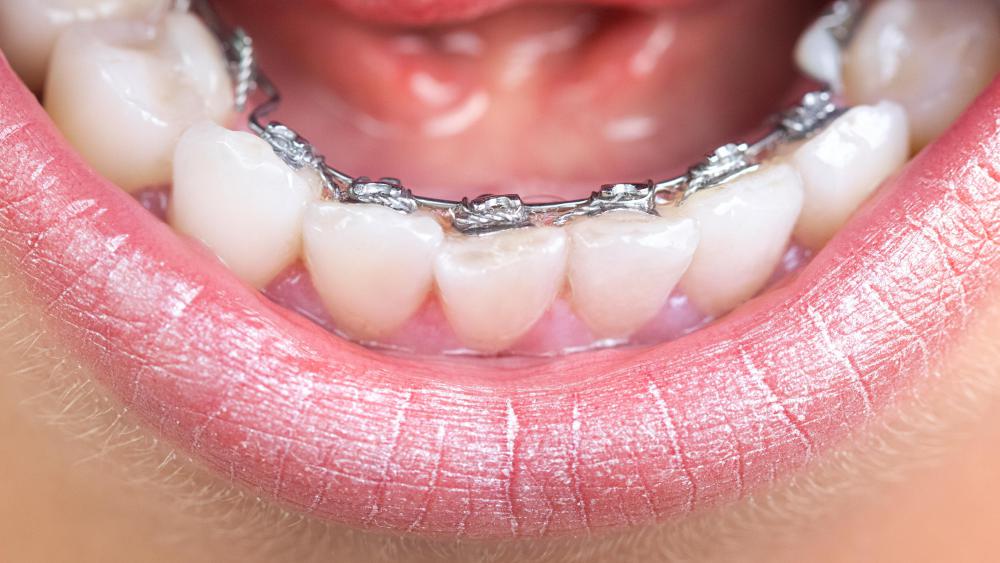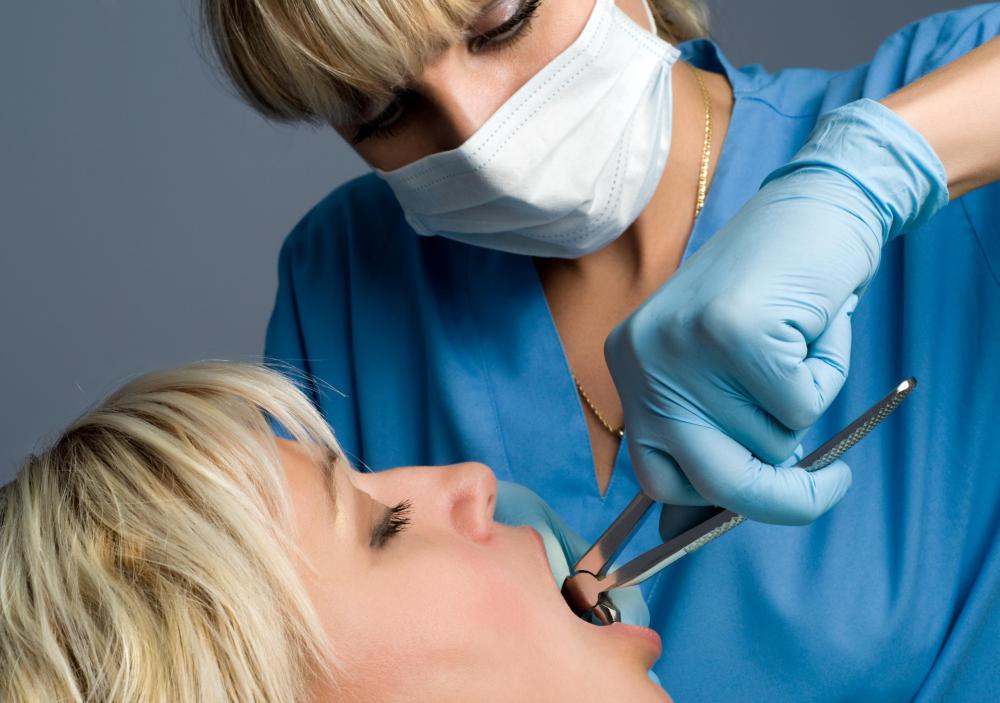At TheHealthBoard, we're committed to delivering accurate, trustworthy information. Our expert-authored content is rigorously fact-checked and sourced from credible authorities. Discover how we uphold the highest standards in providing you with reliable knowledge.
What is a Dental Arch?
The dental arch is the length and width of the line in which a person's teeth are set into their upper and lower jaws. The depth and diameter of this arch are vital to the long-term health of the teeth in particular and the mouth in general. If the arch does not conform to satisfactory standards, it may result in dental and health problems.
Since there are a standard number of teeth in humans, the size of the dental arch is of vital importance in determining how the teeth are positioned when they appear. While the arch can expand as a child grows, a small arch will force the teeth to grow close together. This can result in overlapping and improperly positioned teeth. Teeth may tilt at an awkward angle, putting pressure on gums when food is being chewed. This can ultimately lead to compromised gums or infections.

If the dental arch is too narrow, some teeth may be selected for extraction. This will allow more room for the other teeth; in young patients with teeth that are still in the process of growing, teeth may to some degree correct themselves with the new space. At other times, braces or other corrective measures, such as the insertion of spacers, can be taken. Many individuals have their wisdom teeth removed to prevent crowding in the back of the mouth, at the very ends of the dental arch. Failure to remove them can result in impaction and considerable pain for many.

Alternately, if the dental arch is too long or too wide, teeth may come in with large spaces between them. This is fairly common, and can easily be seen in individuals with gaps between their front teeth; in these cases, the front portion of the dental arch may be too wide. Braces can often be applied in order to shift the teeth forward into the proper position.

The dental arch also determines the proper placement of the teeth around the tongue; improperly formed arches can force teeth to interfere with speech. Consequently, some speech problems can be solved by adapting teeth to better fit the space available in the individual's mouth. A narrow arch can also present an individual with difficulties chewing and make thorough brushing difficult.

Problems with the arch are most common in very young or older individuals. The proper fitting of dentures requires that plates be molded to the exact specifications of an individual's mouth. A shortened arch may result in difficulties fitting dentures, and can cause abnormal pain in the face, jaw, or gums.
AS FEATURED ON:
AS FEATURED ON:




















Discussion Comments
Tooth size and shape obviously also plays into whether or not your teeth will fit on your mouth arches. If you are mixed between two genetic groups with two entirely different mouths, you can inherent teeth and mouth arches that don't go together, creating problems like gaps and crowding.
Like it or not, many races, ethnicities, or even down to individual families, are too genetically different to combine well when you mix them together. When this happens, it can either turn out in a very unique, interesting, maybe even beautiful way. Or, it can cause some of your body parts to not match up correctly, such as your teeth not fitting your mouth arches, or your arms being too long compared to your torso, or being tall with a small skeletal frame (cliche model look - looks stretched out), etc.
I am in no way trying to oppose racial mixing. Many races and ethnicities are similar enough that they mix very well, and create very beautiful children. This is simply why we are not all attracted to all races and ethnicities. Always listen to natural selection. Do not procreate with someone to whom you are not sexually attracted, as the reason you're not attracted is one of the following: they're too genetically related/similar to the point you're either inbreeding or might as well be, they're too genetically dissimilar to the point it can't mix right (as in case of what I am typing of here, mouth arches and teeth not matching up), or they're unfit to procreate at all (such as if they have a severely disadvantageous mutation, or if they are infertile and couldn't have children even if they wish they could). Always listen to your body in mate selection.
If someone grinds their teeth when they sleep, does this affect their dental arch?
My dentist told me it looks like I have started doing this and I am concerned that it might cause me to have some dental problems. My medical insurance does not cover dental services, so I hope this is nothing that becomes too serious.
My dental arch was too wide and I always had a gap between my two front teeth. The cost of dental braces was too much for my parents, so I grew up having this gap in my teeth.
It was something that always bothered me, and when I was able to afford it, I had braces put on my teeth so I would no longer have this big gap. I had braces as an adult, but I am glad I went ahead and had them put on.
Now I no longer feel self-conscious when I smile. This probably never caused me any problems as far as my dental health was concerned, but I feel a lot better about myself since I got this corrected.
For many years my dentist recommended I have wisdom teeth removal since they were coming in sideways and affecting the other teeth in my mouth.
I kept putting this off, and when I finally had them removed, realized why I should have had it done much sooner than I did.
It's never fun to have any kind of dental surgery, but I would recommend someone have this done when they are young. You recover much quicker and you probably have fewer chances of having complications.
Before I had my braces, I had 4 teeth pulled that were crowding the other teeth in my mouth. I think they pulled one tooth on both the top and bottom of each side of my mouth.
I remember when I had this done, my dentist pulled all of them the same day, and I was miserable for awhile. It all paid off in the end, since I now have straight teeth and a smile that I am proud of.
Post your comments